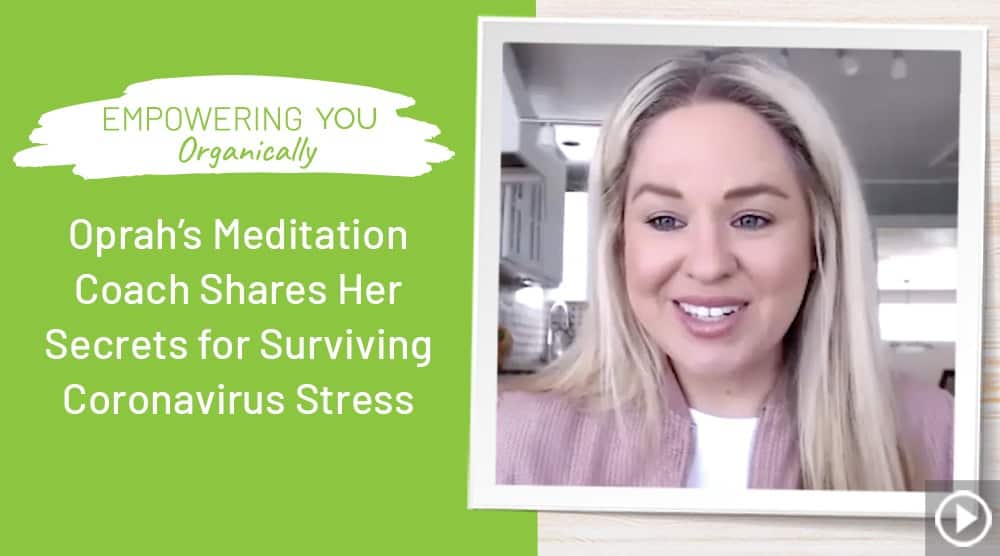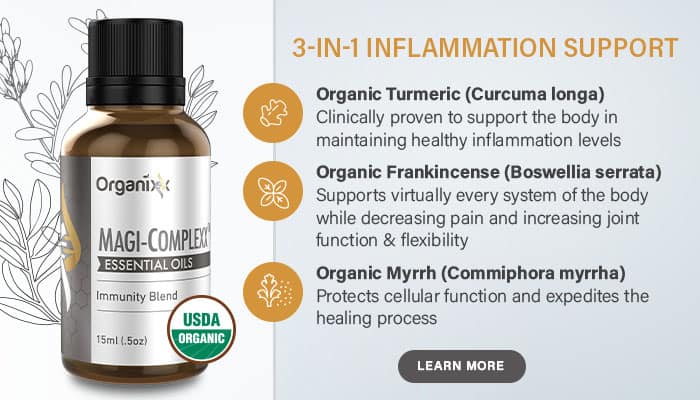Empowering you Organically – Season 10 – Episode 83
Title: Oprah’s Meditation Coach Shares Her Secrets for Surviving Coronavirus Stress
Hosts: Jonathan Hunsaker, TeriAnn Trevenen
Guest: Valerie Gangas, transformational speaker, life coach and author
Description: Navigating the Coronavirus stress is a challenge, but we were lucky enough to chat with Valerie Gangas for an episode this week. Not only has she changed her own life, but she coaches countless others to make those same powerful shifts in their own lives. Valerie was kind enough to share with you today her top 5 ways of managing stress and anxiety during the Coronavirus Pandemic.
***
FEATURED PRODUCT
This Powerful Anti-Inflammatory Supports a Healthy Heart, Boosts the Thyroid, and Promotes Brain Function
- 3 NATURAL INFLAMMATORY SUPPORT AGENTS:Our revolutionary formula combines Frankincense, Myrrh & organic fermented Turmeric into a powerhouse anti-inflammatory supplement.
- SOOTHE ACHING JOINTS: Each of these ancient treasures has been shown through studies to help alleviate joint pain, soothe aching joints and decrease inflammation.
- INCREASE MEMORY & ALERTNESS:Frankincense has been scientifically demonstrated to support a healthy heart, support normal thyroid function, and promote memory and brain function.
- CLEAN INGREDIENTS:We use only the purest and cleanest ingredients. Our Joint & Muscle Care contains all natural ingredients free from fillers, binders and excipients.
***
BIO
Valerie Gangas is a transformational speaker, life coach and author of Enlightenment Is Sexy: Every Woman’s Guide to a Magical Life. She specializes in helping people make radical shifts in their self-perception to gain a deeper understanding of who they are, so they can genuinely thrive and unleash their magic more fully into the world.
Growing up outside Chicago, Illinois, Valerie had an interest in the mysteries of the world and a strong drive to connect with the Universe, which she inherited from her mother who was a poet, former nun and a major influence in Valerie’s life.
Valerie received her bachelor’s degree in theology and women’s studies from DePaul University, and earned her master’s degree in transpersonal psychology and certification in leadership and life coaching at Sofia University in Palo Alto.
The death of Valerie’s mother was a huge turning point in her life, as it caused her to go into a deep suicidal depression, “a complete annihilation of who I was”. During that period in 2011, Valerie learned Transcendental Meditation™ and in her first meditation, she says, “my entire life radically changed in 20 minutes.” The spiritual awakening she experienced was a foundational shift and a powerful transformation in both her awareness and her life. (Hence, the name of her upcoming podcast is: “Everything You Think You Know Is Wrong!”)
The David Lynch Foundation hired Valerie to give talks about the benefits of meditation and developing consciousness within corporations (including respected advertising and financial firms), private practices and student groups at top schools around the country, such as Loyola University School of Medicine. She eventually began working directly with Oprah Winfrey and her staff at Harpo Studios, and for two years she talked to groups of Oprah’s staff members about meditation and consciousness.
Today, Valerie lives in the San Francisco Bay Area, where she is a transformational life coach to clients across the nation. She is also writing her upcoming book about how to create radical transformation in your life, which she plans to launch sometime in 2020.
She’s also passionate about philanthropic pursuits; Valerie sponsors a young lady in Nepal through Shanti Children’s Foundation, is a donor to Charity Seeds, and is currently on the advisory board of the David Lynch Foundation in Chicago.
Valerie sums up her philosophy for optimal living: “Once you’re regularly tuning in to your soul’s voice, through daily meditation, prayer, nature walks, whatever works for you, follow the signs, embrace the mystery, and trust the Universe.”
5 Simple Ways to Calm Your Nervous System
Abridged from Valerie’s blog post. You can find the entire article here: https://www.valeriegangas.com/journal/calm-your-anxiety
Step One: If you’re regularly having issues with stress (and especially if you’re experiencing panic attacks or an overall feeling of being out-of-control), STOP DRINKING CAFFEINE. We have become junkies in the coffee department, but caffeine is a drug, people… and sometimes, in the words of Nancy Regan, we have to “Just Say No.” Let’s take a step back here. If, indeed, you are feeling freaked out on the regular, how in the hell does it make sense that caffeinated beverages are going to help your cause? That’s like throwing gasoline on a fire. Put the Starbucks (or Diet Cokes) down.
Step Two: Breathe. When you start feeling like you’re spinning out of control or stressing out, stop whatever it is you’re doing and breathe. And I’m talking big blue whale-type breaths. Take in as much oxygen as humanly possible, hold your breath for five seconds and then push all the air out. In through the nose, out through the mouth. Continue this practice until you feel your anxiety dissipating. Deep breathing will help, I swear! Your parasympathetic nervous system, which supports relaxation (think opposite of “flight-ot-fight” response), is activated by deep breathing… or if you want to go all spiritual, “yogic breathing.” When you’re losing your cool, that’s your sign to boost your oxygen intake and increase your calming endorphins through some deep breathing. (It’ll also decrease your cortisol/stress hormone levels.) Turn that frown upside-down by breathing that stress right out the door.
Step Three: Meditate. I don’t think it’s any secret I’m a big fan of Transcendental Meditation (TM). It saved my life and yeah, it totally transformed my nervous system. TM is the meditation practice I chose, but there are many paths one can take in the world of meditation. I always say, “I don’t care what you do, but do something.” When you give your mind time to take a deep-dive rest—in the case of TM, twenty minutes, twice a day—you’re giving yourself a chance to feel cool, calm and collected throughout the day. We have a choice, people, whether or not we’re going to be the person who’s running around, day in and day out, like a nutcase, anxious about 83 different things, or the one who takes time each day to calm their mind and body in order to more regularly have a better sense of well-being. Meditation is a super-easy way to give your nervous system the juice it is looking for: deep and restful silence.
Step Four: You are what you eat. A big game-changer for me was when I was tested for food allergies. Once I found out I was allergic to gluten, dairy and peanuts, I knew they were causing inflammation in my body. And inflammation causes stress in the body’s interconnected systems. The fact is, stress causes your levels of cortisol to rise, and a high level of cortisol causes your immune system to break down. Not what we’re looking for, people. Sugar is also a big no-no for anxiety. Kick it out of your diet (or taper it off gradually, if need be) and see how quickly your mind and body smooth out. Bottom line? Eating whole fresh foods is a good idea, if you’re looking for a calm nervous system. This is the best book (see below) I’ve ever found on the topic – it’s by Trudy Scott. She really knows her stuff.
Step Five: Booze. Ya’ gotta’ give it up (or at least cut it back to virtually never), if you have an unhappy nervous system. Not only is it filled with sugar (see Step Four), but it’s a depressant. Sure, you feel good while you’re drinking, but we all know what comes next. A hangover. And holy shit! If you thought you were anxious before you started boozing any given night, you know you’re about to experience a whole new level of hell the next morning. It’s simply not worth it. I’m not telling you to never have a glass of vino again or become a full-out teetotaler. But if you are stressed, have a trash-can kinda’ vibe going on or experience panic attacks, hooch is the last thing you want to be messing with. Tell your drunko friends you need to take a pass while you get your nervous system back on track. And if they don’t have your back, get new friends.
***
Subscribe to Empowering You Organically
Never miss an episode!
APPLE PODCASTS SPOTIFY GOOGLE PODCASTS





